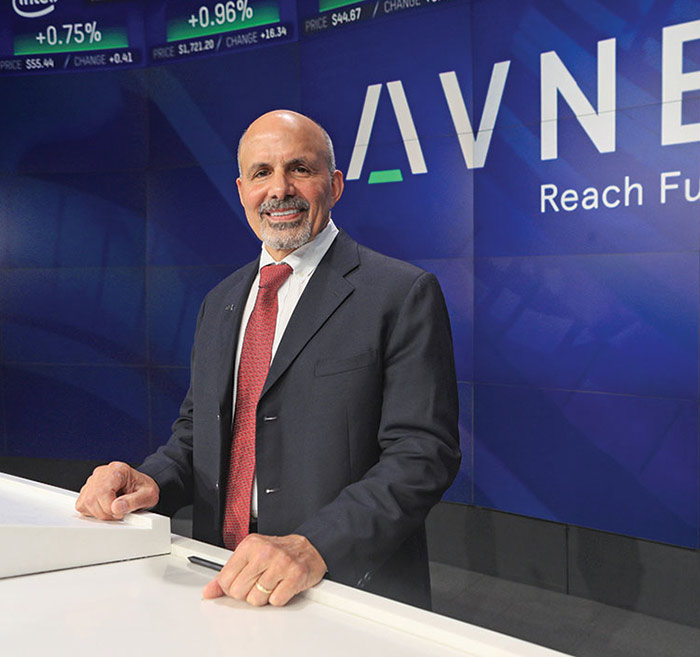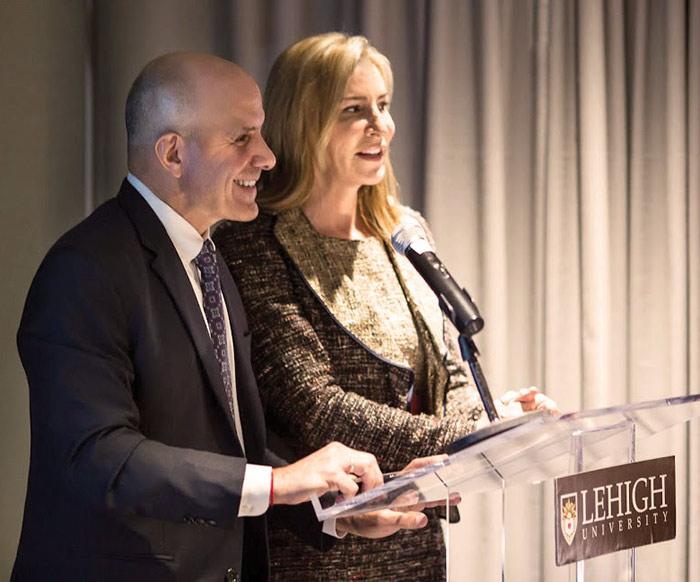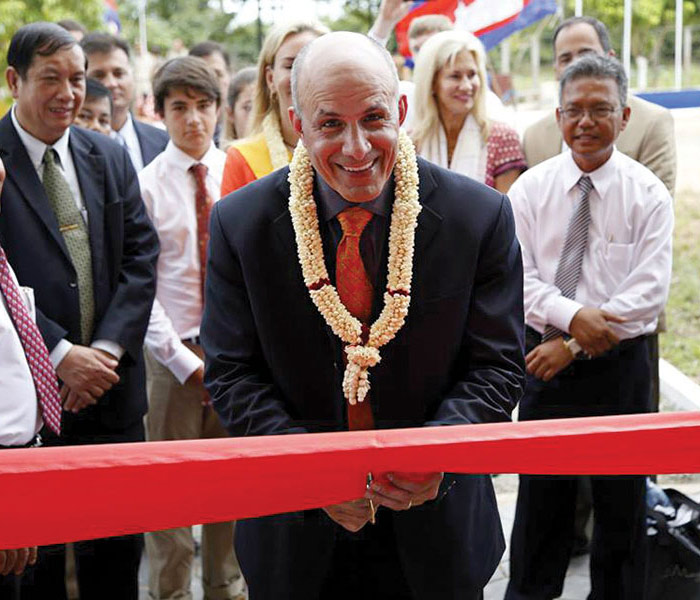William “Bill” Amelio ’79 ’08H ’18P is CEO of Avnet, a global technology solutions company with an ecosystem of experts to support customers at every stage of the product lifecycle. Previously, Bill held executive leadership positions at Lenovo, IBM, Honeywell, Dell, NCR, and AlliedSignal, as well as his most recent post as CEO of CHC Helicopter. In 2003, Bill and his wife Jamie founded Caring for Cambodia, a non-profit that supports thousands of Cambodian children with educational and healthcare services. Bill earned a BS in chemical engineering as well as an honorary doctoral degree from Lehigh, and an MS in management from Stanford University.
 Q: Tell us about Avnet’s transformation. What are you seeing that’s driving you to lead the firm in this direction?
Q: Tell us about Avnet’s transformation. What are you seeing that’s driving you to lead the firm in this direction?
A: Over the past century Avnet has adapted to several waves of technological change. Now we are re-shaping Avnet again because of the Internet of Things (IoT)—and all those connected devices out there that bring IoT to life.
As most companies find out very quickly, it can involve 10 to 12 partners to bring a product to market, making the process very complicated, time-consuming and costly. Avnet is growing into a single-source technology solutions company that supplies our traditional devices but also develops the gateway, the network, the cloud and the analytics for IoT—everything from inception to prototyping, through scale up to production.
Q: How will IoT change the way people interact with their world?
A: It will impact how we make decisions and how we structure our interactions with all sectors of industry. We’re already working with customers on smart urban infrastructures, personalized medicine, efficient agriculture and predictive maintenance for equipment. In our own company, we’re using IoT and artificial intelligence (AI) to help us optimize operations, increase customer and employee satisfaction, and unearth new market opportunities.
Q: IoT is also clearly driving a convergence between the built environment—our hardware— and digital environments—our software. How is that impact being felt in industry?
A: The convergence of information technology (IT) and operations technology (OT) poses big challenges for many organizations. One of them is trust: IT professionals need to trust OT devices to connect to carefully constructed networks, and OT professionals need to feel comfortable with a new security stack. End-to-end security from the device to the final application server is so important. For example, we are currently working with Microsoft on Azure Sphere, a groundbreaking new solution for creating highly secured, internet-connected microcontroller (MCU)-powered devices.
Q: How do you expect this convergence to impact the manufacturing/supply chain landscape in the U.S. and globally?
A: I think supply chains will go through a complete metamorphosis resulting from a combination of emerging technologies. We’ll be able to speed up and automate processes by offloading some decisions to machines. AI will help us optimize our operations, increase customer and employee satisfaction and unearth new market opportunities. However, to fully realize the promise of these technologies, we’ll need to shape a new generation of leaders who understand them—as well as the users of these technologies and the people and groups that design them.
Q: What is the secret to leading a complex organization through changing times?
A: The most powerful thing you can do as a leader is to tell stories that get people energized. Make them proud to be part of the company. Here’s the kind of story I’m talking about. We have a motto: We can do good and do well at the same time. Our partnership with a company called Not Impossible Labs illustrates that vision. Together, we have developed a device that allows the deaf and hard-of-hearing to experience music in an entirely new way.
 We debuted the device at a reveal concert at a big Las Vegas music festival. It was just remarkable. There were tears of joy because for the first time in their lives these people experienced live music on a whole new level. We even invited some of Avnet’s deaf employees to try the product out for the first time, and their reactions were really amazing.
We debuted the device at a reveal concert at a big Las Vegas music festival. It was just remarkable. There were tears of joy because for the first time in their lives these people experienced live music on a whole new level. We even invited some of Avnet’s deaf employees to try the product out for the first time, and their reactions were really amazing.
It’s something you just have to see it for yourself, which you can do on our website.
Q: As we march forward towards this increasingly tech-centric future, how can schools best equip students to thrive?
A: Many experts are thinking more critically about how computational thinking in K-12 curriculum, and beyond, could play an essential role in closing the skills gap. This is more than just creating a generation of coders—it is about creating new skill sets that we will need in the future. I think industry can help in many ways. Through our Farnell, Newark and element14 businesses, for example, Avnet is focused on making computing platforms such as micro:bit, Raspberry Pi and Arduino available to educators and students so they can explore and invent.
Q: For this next generation, what will differentiate leaders from their peers?
A: The ability to think across boundaries—we’re going to need more of that. This is an area where Lehigh students excel, because it is a school that encourages its students to see the world in this way. These are individuals who can say, for example, I’m not just a civil engineer, I’m a computer scientist and an entrepreneur too. In the business world, the demand for people who integrate different competencies is only going to increase. You can learn some of it on the job, but you are clearly at an advantage when you’re already comfortable in several disciplines.
Q How can we support women in corporate leadership roles?
A: To run a company there are three things you have to develop: great strategy process, great execution process and great talent management process. I spend a lot of time on talent management. And in the talent management process, it’s critical that you get more diversity of ideas, gender, race throughout the organization because you get better ideas coming to the table.
Women in leadership is part of that. At Avnet, our own director of business transformation was shocked when she learned that her granddaughter pictured leaders as men—even with her own grandmother in a leadership position at a Fortune 500 firm! So, we have to change that. Avnet supports mentoring programs that encourage women to aspire to leadership, and several times a year we celebrate the success of women moving up in management. Across the business world and especially in technology, we’re not where we need to be, but we are making progress.
 Q: Tell us about the Caring for Cambodia, its evolution, and Lehigh’s engagement in this effort.
Q: Tell us about the Caring for Cambodia, its evolution, and Lehigh’s engagement in this effort.
A: My wife Jamie and I have had a long-term relationship with Cambodia since we started the program in 2003. We’ve really developed something special and remarkable over there. We built 21 schools, which graduate about 600 a year, about 9,000 students overall. It has been life-changing to learn how to make education work in a developing nation.
In fact, we’ve just concluded a five-year program with Lehigh’s College of Education in research and volunteer work. The team helped develop an understanding of our schools’ impact—what’s working, what’s not, and best practices toward achieving our objectives. That was invaluable in ensuring our team was pointing in the right direction for the future. Notably, Caring for Cambodia can boast the highest levels of women in secondary schools, and graduation rate, in the country.
Q: You were a successful Lehigh wrestler. How did that experience impact your life and career?
A: It’s probably the single biggest factor that helps me be so driven. The mental toughness that comes with hating to lose, and getting back up when you get knocked down, is invaluable. Coach Turner was a great role model, and we’re still in contact today. When you wrestle for a top-caliber program like Lehigh, you’re competing against the top talent in the country. It makes you believe in yourself. That experience has remained with me.
